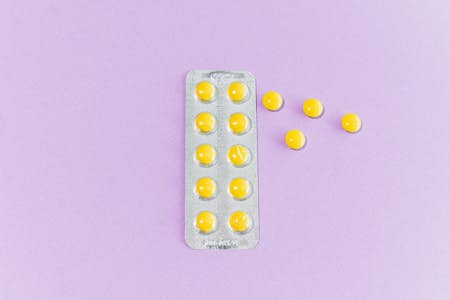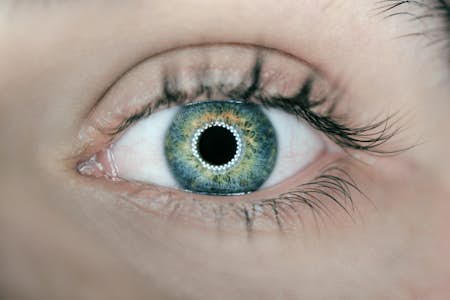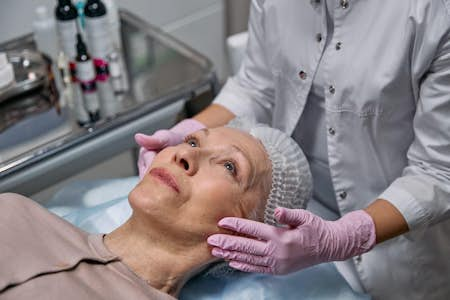Perimenopause is the beginning of the menopausal transition. It is the most challenging period for some women to manage because we don't feel the hormonal changes that come as we approach menopause as a steady decline. Instead, oestrogen, progesterone and testosterone peak and trough, causing multiple menopausal symptoms that range from physical to mental.
There are three stages to menopause. Perimenopause is the beginning, when the ovaries slow and then cease to produce oestrogen, progesterone and testosterone. Oestrogen and testosterone continue to be made by other parts of the body but at much lower levels. Menopause is next; this is just a single day one year after a woman's last period. Finally, postmenopause follows, and hormone levels settle at new, lower quantities.
How do I know if I'm going into menopause?
Initial menopausal symptoms usually begin in midlife but can sometimes be as early as a woman's 30s or as late as her 50s. However, the average age at which menopause begins is 47. If a woman's periods stop before 45, it's known as early menopause. When the ovaries become inactive before the age of 40, it's known as premature menopause. Premature menopause affects around 1% of women under 40 and 0.1% under 30.
Along with natural menopause, when the ovaries stop functioning naturally, a hysterectomy can lead to menopause via surgical intervention. Even if a hysterectomy leaves one or both ovaries in place, menopause will likely follow within five years of the operation.
Contrary to what many believe, changes to the menstrual cycle are not always the first sign of menopause. Although hormone levels fluctuate with the onset of menopause, menstrual periods may remain regular. In some cases, birth control methods like hormonal IUDs and contraceptive implants may have stopped a woman's menstruation cycle, making it impossible to notice any changes to periods.
Difficulty sleeping, remembering things, and increased anxiety are often the first signs that menopause is approaching. This is because progesterone is usually the first hormone to decline. As well as stimulating the growth of the womb lining, it has a calming effect on the brain and body. The lower availability of it in our system can cause trouble with sleeping, increased anxiety and difficulty remembering things.
How does menopause affect the body and mind?
Because hormones influence almost every aspect of our brain and body, when oestrogen levels decline, along with testosterone and progesterone, nearly every part of our system is affected. The top ten signs of menopause include:
- Night sweats
- Hot flashes
- Vaginal dryness
- Lack of energy and sex drive
- Sleep problems
- Palpitations and more noticeable heartbeats
- Difficulty concentrating and remembering things
- Mood changes
- Weight gain
- Recurrent urinary tract infections
Even unusual signs such as burning mouth syndrome, changes in body odour, and itching can be menopausal symptoms. Because the decline in hormones is not steady, instead fluctuating as the ovaries become inactive, symptoms may come and go or be relatively subtle.
As we age, our risk of health problems increases. For women, this means an increased risk of breast cancer which rises by around 3% each year as they enter menopause. HRT slightly increases the risk of breast and ovarian cancers; however, this returns to what it would have been if you never took HRT after treatment ceases. In many cases, the risk versus benefit of HRT means this therapy is often the best course of treatment for menopausal symptoms.
How hormone changes affect women through menopause
While menopause is a natural phase of life, every woman will traverse the menopausal years with slightly different symptoms and treatment needs. Not all women will notice menopausal symptoms. Others may find they need to make sweeping changes to their lifestyle to manage the changes they're experiencing.
Around 20% of women progress through these years without noticing any changes aside from their periods becoming more erratic and then ceasing altogether. A less fortunate 20 - 45% of women experience extreme symptoms that can cause life to become unmanageable. A collaborative study by CIPA and BUPA found that 6 in 10 women found their menopausal symptoms negatively impacted their work.
Hot flashes
One of the more common symptoms of menopause is hot flashes. Around 80% of women experience these at some point throughout menopause. They can occur at night or throughout the day; however, nocturnal hot flashes are generally called night sweats. People sometimes call daytime hot flashes hot flushes; the cause for all is the same.
When oestrogen declines in the body, it impacts the area of our brain responsible for regulating our temperature - the hypothalamus. This becomes sensitive to small temperature changes and causes a rush of blood to the skin and sweat when it senses a woman is too warm. The effect usually lasts between one and five minutes and is often followed by chills.
Low mood
Mood changes and an increased risk of depression, anxiety and increased irritability are also common experiences for women in the menopausal transition. In addition, fluctuating hormone levels can leave some women feeling out of control.
In some cases, hormone therapy such as oestrogen replacement or relaxation techniques can also help. For persistent and severe depression, women should seek the support of their healthcare provider to discuss the benefits of antidepressants.
Vaginal dryness
Lower oestrogen levels change vaginal tissues, causing them to become thinner, dryer and less flexible. Known as vulvovaginal atrophy, this results in decreased lubrication and can cause sex and exercise to become painful.
HRT, in the form of oestrogen creams, lubricants, vaginal moisturizers and patches, can help alleviate dryness and restore the resilience of these tissues. If you're experiencing vaginal dryness, it is best to discuss the various treatment options with your GP and rule out other possible causes.
One Health Times reader, Terry Picken, got in touch as he wanted to share his wife's story with us in the hope that others may find it useful. He told us: “About 10 years ago, my wife was disabled, but we had a decent sex life. Then she started to be very dry, we did try KY Jelly, but eventually, she had to go and see her GP. The doctor prescribed a cream that helped with her hormones, and we enjoyed a few more years, but with her also having fibromyalgia, we had to call it a day.
"But then, she got really ill, was diagnosed with leukaemia, and sadly, I lost her. We had 40 happy years together. I recommend all women talk to their doctors and partners. Help them realise why you no longer enjoy sex – they mostly don’t realise what women are going through.
"At that time in their lives, some women get the idea their partners don’t love them anymore, But they do still love you and will be there for you.”
Urinary tract issues
Both urinary incontinence and repeated urinary tract infections are associated with menopause. Again, these are side effects of declining oestrogen and the impact this has on thinning tissues in this area. Around 50% of menopausal women will experience the discomfort of urinary incontinence. In addition, as many as 36% will suffer from recurring urinary tract infections.
Unfortunately, pelvic floor exercises will only help to a small degree. Oestrogen creams and other forms of HRT may help, as will ensuring you remain hydrated throughout the day and regularly empty your bladder.
How to reduce menopausal symptoms
Understanding this phase of women's health is the first step to managing and reducing the impact that menopause can have on your life. Lifestyle changes, such as ensuring you get regular exercise, enough sleep, and eating a balanced diet with enough vitamins and minerals to support bodily functions, are a great place to start.
Supplements to reduce menopause symptoms
Vitamin D is vital through menopause years. Vitamin D supports bone health and can help prevent osteoporosis, depression and other medical conditions such as high blood pressure and heart disease. Fortunately, this is free - step outside and let the sun shine on your bare skin for ten minutes to receive a daily dose of vitamin D!
Calcium-rich foods are also recommended at this time as up to 10% of bone mass is lost in the first five years after menopause. In addition, vitamin and mineral supplements such as B complex and magnesium can also be beneficial through the menopause years. Vitamin B supports hair, skin, nails and brain health, while magnesium is necessary for more than 300 bodily functions.
Evening primrose oil has long been associated with women's health and is thought to help maintain hormonal balance. One study also found it helpful in decreasing the intensity and frequency of hot flashes.
Many other supplements may ease the transition through the menopausal years, too.
Black Cohosh
Black Cohosh, made from the root of the North American plant, has been found to ease hot flashes but should be avoided if you have liver issues.
Flaxseeds
First cultivated in Egypt and now found worldwide, this seed and its oil are known to help with sleep issues through menopause. High levels of tryptophan, magnesium and omega-3 fatty acids can help relieve stress and relax muscles. The lignans contained in these seeds also work to balance female hormones.
Ginseng
Found to relieve stress-related depression, this root from the native Asian or South American plant has long been used in traditional medicines. Along with reducing stress, studies have found it can improve mental performance, learning, memory and sensory awareness.
St John's Wort
Used for treating depression and low mood, the flowers and buds of this native European plant increases levels of serotonin, dopamine and noradrenaline to lift and stabilize mood.
Exercising to relieve menopausal side effects
Muscle mass declines by around 8% each year from age 40 onwards. Unless we exercise regularly to maintain our strength, this can exacerbate feelings of fatigue, cause an increased risk of weight gain, obesity and a host of associated health problems. Ensuring you get a mix of cardio-based exercise and strength training will combat the natural decline of muscle mass.
Regular exercise can also help with sleep difficulties, as will maintaining a regular bedtime and wake time - even at weekends. Excellent sleep hygiene brings many benefits that will help reduce the risk of menopause symptoms. By ensuring we can complete the full set of sleep cycles multiple times each night, we give our bodies and minds the necessary time to repair and restore in preparation for the day ahead.
Jane Pangbourne from Menopausal Not Mad told Health Times: "I consider that experiencing menopause is actually a privilege.
"We are fortunate to not only be able to outlive our hormones but also to safely replace them via modern HRT preparations. At Menopausal Not Mad and in the free Facebook group we work hard to ensure that women understand the facts and truths about HRT and it’s safe use in order to manage both symptoms and the long term health challenges of low hormone levels (osteoporosis, dementia, diabetes, depression heart disease).
"Nutrition and exercise are also important for good health of course, and as a qualified nutritionist, I would be misguided to suggest otherwise! but it is so important that we don’t ignore the importance of our hormones which affect almost every cell in the body.
"A good example of this is the use of low dose transdermal testosterone supplementation for peri and postmenopausal women. This tricky little hormone is often forgotten about and considered to be a male-only hormone but, prior to perimenopause, our ovaries actually produce 3-4 times more testosterone than estrogen so it’s very necessary and clearly evidenced to improve libido, mood, brain health and much more.
"Ultimately HRT is not a lifestyle drug as it is regarded by some. The replacement of our natural hormones is a vital solution to a better quality of life and longer-term good health but it is also an individual choice."









